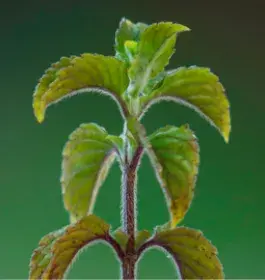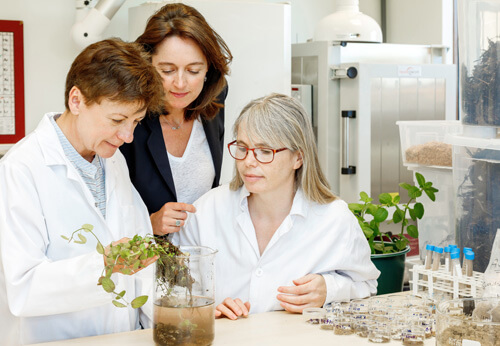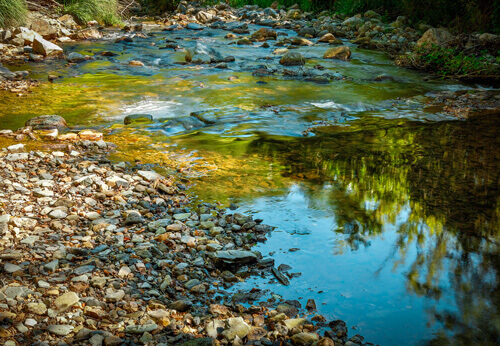Cleaning water with Aquatic Mint !
Purify polluted water thanks to an exceptional plant: the Aquatic Mint.


Micke Science explains !
Micke Science explains how aquatic mint could clean our rivers of heavy metals such as zinc or lead. The roots of this plant, once crushed and dried, have the property of adsorbing these contaminants. The good news is that once captured, these metals can be reintegrated into industrial channels, offering a zero-waste solution. This property of aquatic mint represents a significant advancement in the protection of our aquatic ecosystems.
Micke Science, science communication content creator
Using an incredible plant, Aquatic Mint water mint, to purify polluted streams.
Mint could depollute entire rivers
Its hidden power is no longer a secret
Aquatic mint had kept a secret until recently. Its power is huge. The plant has revealed an immensely wonderful ability: the capacity to trap the pollution present in its environment, specifically in water.
So how not to start thinking about an amazing plan to save the many damaged rivers on our planet? What if we could use water mint to create a green filter in order to clean polluted rivers?
This discovery could be a game changer at a time when water quality and its protection have become major issues for our society. As making it real requires testing and proofs, Klorane Botanical Foundation has chosen to share resources with some of the greatest research teams: the Bio-inspired chemistry and Ecological Innovations Lab. An innovating project is born.
A new way to protect nature
... with a full-scale pilot project. In order to put to the auspicious promises of Aquatic Mint, only real conditions will do . We have chosen a place in south-central France, the valley of the Vis, where past mining activities have polluted a stream with heavy metals.

And on for an ambitious project! Large natural filters made with Aquatic Mint (more specifically, its roots, dried and grinded) will be placed in the polluted streams flowing down from the mine, before they reach the Vis.
Further down the filtered water will meet the plant gain, in a basin, where water mint will have been planted (therefore remaining alive) in order to catch any leftover common metal particle.
From lab to nature
Lab testing
The project did not come out of the blue. Lab research came first and got everyone's hopes up about the possibilities of a new water cleaning system. Initial results for the research led on Tsinghua University, China, were incredibly conclusive and demonstrate the exceptional capacity Aquatic Mint has to purify water loaded with toxic bacteria and algae.
 Other lab protocols came along to confirm these results, such as those led by the Bio-inspired chemistry and Ecological Innovations Lab we have undertaken this action with, focusing on water polluted by heavy metals. Their results were breathtaking: Aquatic Mint roots displayed exceptional talent to absorb metal particles. The time had come to move from lab testing to real conditions testing, with the hope that the results could lead to a full democratization of this new type of natural filter.
Other lab protocols came along to confirm these results, such as those led by the Bio-inspired chemistry and Ecological Innovations Lab we have undertaken this action with, focusing on water polluted by heavy metals. Their results were breathtaking: Aquatic Mint roots displayed exceptional talent to absorb metal particles. The time had come to move from lab testing to real conditions testing, with the hope that the results could lead to a full democratization of this new type of natural filter.
From France to the world
The aim of the full-scale testing is to find the most efficient method to filter water with Aquatic Mint and to pave the way for new natural environment depolluting methods. There is indeed already a solution at work on the polluted site we work on, based on lime. But the high cost and huge technicality involved by this method or other existing ones in comparison to the plant-based filters are simply not satisfying. Not to mention the environmental aspects of the question! Once again, nature is showing us that it already has the answers to our needs, we just need to look for them in the right place...
An innovative water purification device
After three years of research and full-scale experiments, the Bio-Inspired Chemistry and Ecological Innovations Laboratory, known as ‘ChimEco’, (backed by France’s National Centre for Scientific Research) has developed an innovative ecological water purification device using water mint.
A semi-industrial pilot scheme took place in Saint-Laurent-le-Minier (Cévennes) to filter 10m3 of zinc- and iron-contaminated effluent (owing to the region’s mining past) per hour. The plant-based filters, saturated with heavy metals, are fully recycled and the molecules transformed into eco-catalysts of chemical reactions.
In 2020, the start-up BioInspir was founded in order to industrialise this process and develop new patented plant-based filters capable of decontaminating water.

Say hello to Aquatic Mint !
Scientific name : Mentha aquatica
Family : Lamiaceae
This short perennial plant, Mentha aquatica, is about 14 to 20 inches high and grows in moist places such as river banks. It blossoms in July, but its strength is far from being just esthetic: Aquatic Mint is a genius when it comes to depolluting water.

China, a pathfinder
Klorane Botanical Foundation is working hand in hand with the School of Environment of Tsinghua University, in China. The experts have managed to prove the amazing abilities of water mint to purify water from the kind of toxic algae often found in standing water and prevent its development.
Protecting water is a priority for tomorrow

The water in the valley of the Vis is no isolated case when it comes to pollution, as we all know too well. And water issues go far beyond pollution problems: water on our planet is to be saved overall.
Our resources in freshwater, when not polluted, are diminishing due to climate change, deforestation, human activities... Today, it is urgent that we protect our water if we want to save biodiversity and humanity.
